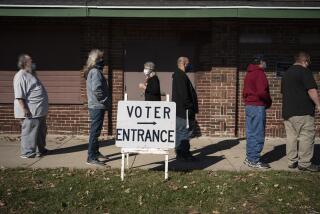House to Debate Campaign Reform
- Share via
WASHINGTON — House Republican leaders, bowing in the face of a rank-and-file rebellion, said Tuesday that they will schedule a showdown debate next week on campaign finance reform.
In his announcement that the issue will come to the floor Feb. 12 and 13, Speaker J. Dennis Hastert (R-Ill.) said: “I expect there will be a vigorous debate on this issue that will reflect well on the House of Representatives.”
The move sets in motion a frantic final week of lobbying on whether and how to limit big-money donations. At stake are what could be the most significant changes to the nation’s political finance laws in more than 20 years.
Proponents of strict limits, led by most House Democrats and a small bloc of renegade Republicans, have received a major boost from recent public scrutiny of the political influence wielded by the now-bankrupt Enron Corp. Their goal is to ban “soft money”--the unlimited donations to political parties. There are already limits on the amount that can be given to individual candidates.
The Senate approved a ban on soft money last year, voting 59 to 41 for legislation sponsored by Sens. John McCain (R-Ariz.) and Russell D. Feingold (D-Wis.).
Opponents, including most congressional Republicans, say that Enron got little or nothing for the nearly $6 million it gave to political parties and candidates since 1989. They argue that a soft-money ban would wreak havoc on the political system and would likely prove unconstitutional.
The stakes in the House are high. President Bush has signaled to House GOP leaders that he cannot be relied on to veto a campaign finance bill if one reaches his desk.
Tuesday’s announcement by Hastert represented a speedy acknowledgment of a political reality thrust upon him last month.
On Jan. 24, supporters of the main campaign finance reform bill reached a critical mass of signatures of House members--218, a bare majority--needed to force a vote on the issue despite the objections of GOP leaders. Such discharge petitions, as they are known, rarely succeed in the House, where the majority party wields enormous procedural power.
Last year, Hastert also scheduled a campaign finance debate, but it was canceled after Republicans and Democrats failed to agree on ground rules.
This time, Hastert said, the ground rules will be those supported by the petition signers. That would mean the House can vote on a soft-money ban and other provisions offered by Reps. Christopher Shays (R-Conn.) and Martin T. Meehan (D-Mass.).
Under the petition, lawmakers would also be able to vote on alternatives from Reps. Robert W. Ney (R-Ohio) and Albert Russell Wynn (D-Md.)--who want to limit but not ban soft money--and from House Majority Leader Dick Armey (R-Texas).
Greg Crist, an Armey spokesman, said he has “serious reservations” about the Shays-Meehan bill “and will work to oppose it.”
More to Read
Get the L.A. Times Politics newsletter
Deeply reported insights into legislation, politics and policy from Sacramento, Washington and beyond. In your inbox twice per week.
You may occasionally receive promotional content from the Los Angeles Times.










